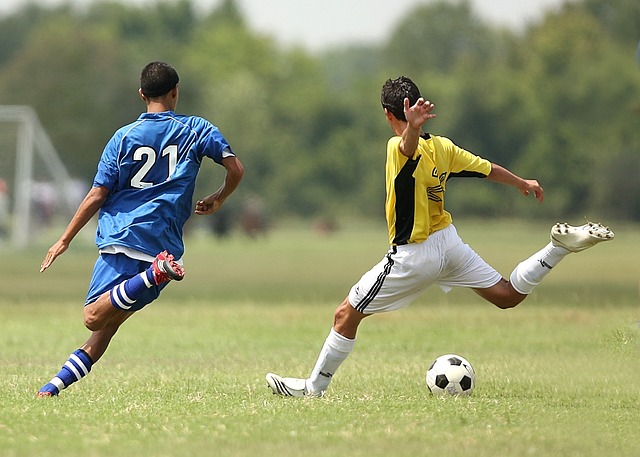Get ready to dive into the world of U13 soccer! In this article, we’ll explore the exciting journey of youth soccer, unravelling all its challenges and triumphs along the way.
Contents
- 1. Building a Solid Foundation: The Importance of Fundamentals in U13 Soccer Development
- 2. Balancing Fun and Competitive Play: Fostering a Positive Youth Soccer Experience
- 3. Nurturing Teamwork and Sportsmanship: Instilling Core Values in U13 Soccer Players
- 4. Growth Mindset in U13 Soccer: Encouraging Resilience and Learning from Setbacks
- 5. Maximizing Player Development: Ensuring A Holistic Approach to U13 Soccer Training
- 6. Understanding Physical Demands: Tailoring Conditioning Programs for U13 Soccer Players
- 7. Tactical Awareness: Teaching U13 Soccer Players to Read and React on the Field
- 8. Effective Communication: Connecting U13 Soccer Coaches, Players, and Parents
- 9. Navigating Injuries: Minimizing Risks and Promoting Healthy Recovery in U13 Soccer
- 1. Warm-up and Stretching
- 2. Focus on Proper Technique
- 10. Preparing for Success: Strategies for U13 Soccer Players Transitioning to Higher Levels
- 1. Embrace a Growth Mindset
- 2. Master the Basics
- 3. Enhance Physical Fitness
- 4. Develop Tactical Understanding
- 5. Foster Mental Resilience
- 6. Seek Feedback and Learn from Coaches
1. Building a Solid Foundation: The Importance of Fundamentals in U13 Soccer Development
When it comes to U13 soccer development, building a solid foundation is key to ensuring long-term success for young athletes. The importance of fundamentals cannot be overstated in the world of youth soccer. In these formative years, players are still developing both physically and mentally, and it is crucial to provide them with a strong base of skills and knowledge to build upon.
Developing proper technique is the cornerstone of any successful soccer player’s journey. U13 players should focus on mastering essential skills such as passing, dribbling, shooting, and receiving the ball. Emphasizing these fundamental skills early on allows young players to develop good habits, which they can then refine and build upon as they progress through higher levels of competition.
- Passing: Teaching proper passing technique is vital, as it lays the foundation for effective teamwork and ball movement.
- Dribbling: Helping players develop close ball control and the ability to change direction quickly is crucial in creating attacking opportunities.
- Shooting: Introducing shooting techniques early allows players to develop accuracy and power over time, enhancing their scoring abilities.
- Receiving the ball: Teaching young players how to control and cushion the ball upon receiving it helps improve their first touch and overall ball control.
By focusing on these fundamental skills, U13 soccer players can gain confidence and a strong technical foundation that will lay the groundwork for future success. Building a solid foundation is not just about developing individual skills but also about fostering a love for the game and promoting teamwork.
2. Balancing Fun and Competitive Play: Fostering a Positive Youth Soccer Experience

When it comes to youth soccer, one of the key aspects of creating a positive experience is striking the right balance between fun and competitive play. For U13 soccer players, this delicate balance can be especially challenging as they navigate the ups and downs of the game. As coaches and parents, it is important to foster an environment that allows them to enjoy the game while also helping them grow and develop as players.
Here are some strategies to help achieve this balance:
- Emphasize teamwork: Encourage players to work together as a team and highlight the importance of supporting and uplifting one another. This will not only help them develop a sense of camaraderie but also foster a positive and supportive atmosphere.
- Focus on skill development: While the competitive aspect of soccer is important, it is equally crucial to prioritize skill development. Provide players with ample opportunities to improve their technical abilities through drills, exercises, and practice sessions.
- Set realistic goals: Help young players set realistic goals that focus on personal improvement rather than solely on winning. This will ensure they enjoy the journey of becoming a better player and not get discouraged by outcomes they have limited control over.
By implementing these strategies, a positive and balanced youth soccer experience can be created for U13 players. Remember, it’s not just about winning or having fun; it’s about instilling values, fostering growth, and creating lifelong memories on and off the field.
3. Nurturing Teamwork and Sportsmanship: Instilling Core Values in U13 Soccer Players
<p>
As youth soccer players enter the U13 level, they face new challenges and experiences both on and off the field. It is during this crucial stage that coaches and parents play a vital role in instilling core values such as teamwork and sportsmanship. By focusing on developing these traits, young players not only improve their soccer skills but also learn valuable life lessons that will benefit them beyond the sport.
</p>
<p>
Building teamwork among U13 soccer players is essential for their growth and success. Encouraging effective communication, fostering mutual respect, and emphasizing collaboration are key principles to foster a cohesive team dynamic. Coaches can organize team-building activities and drills that require players to work together, rely on each other's strengths, and support one another. By nurturing teamwork, players will develop a sense of camaraderie and unity that strengthens their bond on and off the field, leading to improved overall performance and a positive team culture.
</p>
<p>
Equally important is cultivating sportsmanship within U13 players. Teach them to respect their opponents, officials, and teammates, regardless of the game's outcome. Encourage fair play, emphasizing the importance of abiding by the rules and accepting both victories and defeats graciously. By instilling sportsmanship values, young soccer players learn empathy, humility, and resilience. Through positive reinforcement and leading by example, coaches and parents shape player's attitudes and character, helping them become not only skilled athletes but also respectful and well-rounded individuals.
</p>4. Growth Mindset in U13 Soccer: Encouraging Resilience and Learning from Setbacks

As young soccer players progress through the U13 level, they encounter a range of challenges and triumphs that shape their development both on and off the field. One key aspect of fostering their growth is the cultivation of a growth mindset – a belief that abilities and intelligence can be developed through dedication and hard work. By instilling this mindset in U13 soccer players, coaches and parents can positively influence their resilience, attitude towards setbacks, and overall performance.
Encouraging a growth mindset in U13 soccer requires a holistic approach that emphasizes the importance of effort, learning, and perseverance. Here are a few strategies that can be employed to nurture a growth mindset:
- Celebrate effort and improvement: Recognize and praise players for their hard work and progress, rather than solely focusing on outcomes.
- Emphasize the learning process: Encourage players to view setbacks as learning opportunities and help them understand that mistakes and failures build resilience and ultimately lead to growth.
- Set realistic and attainable goals: Help players establish short-term goals that are challenging yet achievable, promoting a sense of accomplishment and motivation to continue improving.
5. Maximizing Player Development: Ensuring A Holistic Approach to U13 Soccer Training
When it comes to U13 soccer, navigating the challenges and triumphs of youth soccer can be a dynamic journey. As coaches, parents, and players, we all share a common goal: to maximize player development. And to achieve this, it is crucial to embrace a holistic approach to training that considers the physical, mental, and emotional aspects of the young athletes.
In order to foster the growth of U13 players, it is important to provide a well-rounded training program that focuses not only on technical skills but also on crucial life skills. By incorporating strength and conditioning exercises into their training routine, young soccer players can enhance their physical abilities, reduce the risk of injuries, and improve their overall performance on the field. Moreover, emphasizing the importance of teamwork, communication, and perseverance can help these young athletes develop strong character traits that will benefit them both on and off the pitch.
- Create a mindset for success: Encourage players to set goals and develop a positive mindset that allows them to overcome challenges and embrace personal growth.
- Emphasize technical skill development: Provide ample opportunities for players to practice and master key soccer skills such as dribbling, passing, and shooting through fun and engaging exercises.
- Promote physical fitness: Incorporate age-appropriate strength and conditioning exercises into training sessions to improve endurance, speed, agility, and overall physical performance.
- Cultivate good sportsmanship: Teach the importance of fair play, respect for opponents, and grace in both victory and defeat, fostering a positive and respectful team culture.
Remember, as coaches and mentors, it is our responsibility to not only help these young athletes become better soccer players but also to guide them in becoming well-rounded individuals. By adopting a holistic approach to U13 soccer training, we can ensure that each player reaches their full potential and enjoys every step of their soccer journey.
6. Understanding Physical Demands: Tailoring Conditioning Programs for U13 Soccer Players
When it comes to conditioning programs for U13 soccer players, understanding their physical demands is key to ensuring optimal performance on the field. At this stage of their development, young players are still growing and their bodies are constantly changing. It is important to tailor conditioning programs that take into account their unique needs and capabilities.
<p>First and foremost, it is essential to prioritize injury prevention. U13 players are more susceptible to certain injuries due to their rapid growth and the demands of the sport. Our conditioning program focuses on strengthening key muscle groups, improving flexibility, and developing balance and coordination. By incorporating exercises such as lunges, squats, planks, and dynamic stretches, we help players build a solid foundation and reduce the risk of injuries during intense matches and training sessions.</p>
<p>Additionally, cardiovascular endurance plays a crucial role in U13 soccer. As players transition from shorter games to full-length matches, their stamina needs to be developed accordingly. Our program includes interval training sessions that simulate the intensity of the game and gradually increase the duration of continuous play. This allows young players to build their aerobic capacity while developing the ability to maintain a high level of performance throughout the entire match.</p>
<p>It is important to note that every U13 player is unique and may have varying levels of physical fitness and skill. Therefore, our conditioning program also emphasizes individualized training. This includes understanding each player's strengths, weaknesses, and specific areas that require improvement. Through personalized assessments and targeted exercises, we aim to maximize the potential of each player while creating a positive and supportive environment for their development.</p>
<p>In conclusion, tailoring conditioning programs for U13 soccer players is crucial for their physical development and overall performance. By focusing on injury prevention, cardiovascular endurance, and individualized training, we help young players navigate the challenges and triumphs of youth soccer, setting them on a path to success.</p>7. Tactical Awareness: Teaching U13 Soccer Players to Read and React on the Field

In the world of youth soccer, U13 is a crucial age group where players begin to develop their tactical awareness on the field. At this stage, it is important to focus on enhancing their ability to read the game and react accordingly. Tactical awareness refers to a player’s understanding of the overall game dynamics, including positioning, spatial awareness, decision-making, and communication. By honing these skills, U13 soccer players can significantly elevate their game and set themselves up for success in the future.
One key aspect to consider when teaching tactical awareness to U13 soccer players is creating a foundation of basic principles. Start by introducing them to the concept of reading the game and encourage them to constantly assess the situation around them. Emphasize the importance of paying attention to the movement of their teammates and opponents, as well as the positioning of the ball. By doing so, players will learn how to anticipate plays and make intelligent decisions in real-time. Furthermore, engaging in small-sided games and drills can provide ample opportunities for players to practice their tactical skills while enjoying the game.
8. Effective Communication: Connecting U13 Soccer Coaches, Players, and Parents
As U13 soccer coaches, players, and parents, effective communication is key to navigating the challenges and triumphs of youth soccer. Open lines of communication foster a supportive and successful environment for all involved. Here are some tips to help connect coaches, players, and parents:
- Regular Team Meetings: Organize regular team meetings to discuss goals, strategies, and expectations. This provides an opportunity to ensure everyone is on the same page and fosters a sense of unity within the team.
- Clear Channels of Communication: Establish clear channels of communication between coaches, players, and parents. This can be through team websites, group messaging apps, or regular email updates. By keeping everyone informed, it promotes a sense of inclusivity and helps address any concerns or queries.
- Active Listening: Encourage active listening among all parties involved. Coaches should give players and parents the chance to express their thoughts, concerns, and suggestions. By actively listening, coaches, players, and parents can work collaboratively towards the common goal of the team’s success.
Additionally, it is important to remember that effective communication goes beyond merely exchanging information. It also involves building strong relationships and ensuring mutual understanding and respect between coaches, players, and parents. Here are some additional strategies to enhance communication within your U13 soccer team:
- Positive Feedback: Provide regular positive feedback to players, acknowledging their efforts and achievements. This boosts their confidence and builds a positive team spirit.
- Parent Involvement: Encourage parent involvement by inviting them to observe training sessions or volunteer as team helpers. This fosters a sense of community and allows parents to better understand and support their child’s soccer journey.
- Individual Check-Ins: Schedule regular individual check-ins with players to discuss their progress, address any concerns, and set individual goals. This personalized approach shows that each player’s development is valued.
As young athletes embark on their U13 soccer journey, it’s crucial to address the challenges surrounding injuries and prioritize their healthy recovery. By understanding how to minimize injury risks and promoting a safe environment, we can ensure that our young soccer stars stay in the game and grow stronger with each passing season.
1. Warm-up and Stretching
Encourage your U13 soccer players to warm up properly before each training session and game. A dynamic warm-up routine consisting of light jogging, dynamic stretches, and sport-specific movements helps increase blood flow, flexibility, and agility. Dynamic stretching exercises such as high knees, heel flicks, and sideways lunges can effectively prepare the body for the demands of soccer.
Key Takeaway: Start every session with a thorough warm-up and dynamic stretching routine to decrease the likelihood of injury.
2. Focus on Proper Technique
During practice sessions, prioritize teaching proper technique to your U13 players. Emphasize the importance of correct body positioning, balanced movements, and good posture when executing various soccer skills. By mastering the fundamentals, players can reduce the risk of strains, sprains, and overuse injuries.
Key Takeaway: Regularly reinforce correct technique in training sessions to enhance the overall safety of U13 players and improve their performance on the field.
10. Preparing for Success: Strategies for U13 Soccer Players Transitioning to Higher Levels
Transitioning from U13 soccer to higher levels can be an exciting but challenging journey for young players. As they set their sights on reaching new heights in their soccer careers, it is crucial to provide them with the necessary strategies for success. Here are some essential tips to help U13 soccer players navigate the challenges and triumphs of youth soccer at higher levels:
1. Embrace a Growth Mindset
Encourage U13 players to develop a growth mindset, where they see challenges as opportunities for improvement. Remind them that making mistakes is a natural part of the learning process, and the focus should be on continuous growth both on and off the field.
2. Master the Basics
Ensure players have a solid foundation by mastering basic soccer skills such as passing, dribbling, and shooting. Emphasize the importance of consistent practice and repetition to develop muscle memory and enhance overall performance.
3. Enhance Physical Fitness
As players progress to higher levels, physical fitness becomes increasingly important. Encourage U13 players to engage in regular conditioning exercises, including aerobic and strength training, to improve endurance, speed, and agility on the field.
4. Develop Tactical Understanding
Help players develop a deeper understanding of game tactics by exposing them to various formations and strategies. Teach them how to read the game, anticipate plays, and make calculated decisions that contribute to the overall team’s success.
5. Foster Mental Resilience
Youth soccer at higher levels can be mentally demanding. Teach U13 players techniques to build mental resilience, such as visualization, positive self-talk, and stress management. Emphasize the importance of maintaining composure during challenging situations.
6. Seek Feedback and Learn from Coaches
Encourage players to actively seek feedback from their coaches and take it as an opportunity to grow. Remind them that constructive criticism is not a reflection of failure but a chance to refine their skills and become better players.
In conclusion, U13 soccer brings both challenges and triumphs for young players. By focusing on skill development, teamwork, and fun, players can overcome obstacles and thrive. Embrace the ups and downs, for they shape future accomplishments.



